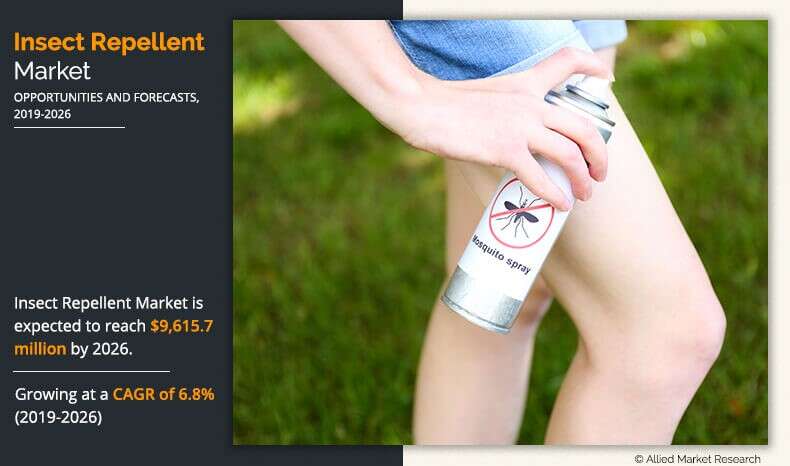According to a new report published by Allied Market Research, titled, “Insect Repellent Market by Insect Type and Product Type: Global Opportunity Analysis and Industry Forecast, 2019-2026,” the global insect repellent market is expected to generate $ 9,615.7 million by 2026, growing at a CAGR of 6.8% from 2019 to 2026. The report offers an extensive analysis of key growth strategies, drivers, opportunities, key segment, Porter’s Five Forces analysis, and competitive landscape.
In 2018, the vaporizer segment led the insect repellent market, followed by the spray segment. Growth in this segment is supplemented by increase in awareness of insect-borne diseases such as malaria, zika, Lyme disease, dengue, bubonic plague, river blindness, and west Nile fever.
Increase in consumer awareness about insect-borne diseases and different government initiatives for lowering down the ill-effects of insectsdrive the growth of the global insect repellent market. However, availability of toxic chemicals including DEETin mosquito repellent products restrains the market growth. On the other hand, surge in demand for herb-based repellents and creation of commercial repellent products that include plant-based ingredients would offer new opportunities in the next few years.
Request The Free Sample PDF of This Report (Flash Sale Till 20th August 2022): https://www.alliedmarketresearch.com/request-sample/5595
The global temperature of the earth has continued to rise since past few years and is expected to increase more in the coming years, high temperature provides optimum conditions to the mosquitoes to breed and increases their level of activeness. Thus, impact of the rise in global warming would directly impact the growth of mosquito population which would ultimately lead to an increase in the penetration of products designed to repel them. The key market players have consistently engaged themselves into implementing effective marketing strategies aimed toward the promotion of various mosquito repellents. Companies have regularly involved themselves into spreading awareness amongst the people through various awareness campaigns and free sample distribution.
A few companies such as Godrej targeted mothers to promote their sales for ‘Good Knight’ brand through advertising and creating a sense of fear in their minds related to their children getting infected with mosquito borne diseases. This has resulted into an increased sale of various products across the world to prevent diseases. The impact of these innovative marketing strategies are expected to continue to propel the demand for mosquito repellents in future.
The global insect repellent market is classified on the basis of insect type into mosquito, bugs, fly repellent, and others. The mosquito segment dominated the market with the largest share in 2018 and is expected to exhibit significant growth during the insect repellent market forecast period. The rise in incidence of mosquito-borne diseases and global warming, which facilitates breeding of mosquitoes, are the prime factors that are expected to drive the market during forecast period. Other factors that drive the market are rising health awareness, government initiatives for mosquito control, and affordable cost of repellents. However, presence of toxic chemicals, such as DEET, in various mosquito repellent products cause ill effects on health, which are likely to restrain the growth of this market. Huge opportunities prevail for the global repellent market owing to the rise in demand for plant-based repellents and increasing penetration in untapped markets in rural regions.
The key players of the insect repellent industry profiled in this report include:
• Reckitt Benckiser Group
• The Godrej Company
• Dabur International
• Johnson and Johnson
• Spectrum Brands
• Jyothi Labs
• Swayer Ltd.
• Himalaya Herbals
• Enesis Group
• Quantum Health.
Need a Discount? Getting Exclusive Discount And Free Consultation @https://www.alliedmarketresearch.com/purchase-enquiry/5595
Key Findings of the Insect Repellent Market:
• Based on insect type, the mosquito segment was the highest contributor to the global insect repellent market demand in 2018 and is projected to grow at a CAGR of 6.3%.
• Based on product type, the vaporizer insect repellent market size is expected to grow at the highest CAGR of 7.0% from 2019 to 2026.
• Based on product type, the spray segment is expected to grow at a CAGR of 7.5% from 2019 to 2026.
• Based on region, Asia-Pacific insect repellent market size is projected to grow at a CAGR of 8.8% from 2019 to 2026.
• China held the largest market insect repellent market share of 42.4% in 2018 and is expected to grow at a CAGR of 8.6% from 2019 to 2026.
• In terms of value, Asia-Pacific and LAMEA collectively contributed a 59.5% share to the global insect repellent market in 2018.
About Allied Market Research:
Allied Market Research (AMR) is a full-service market research and business-consulting wing of Allied Analytics LLP based in Portland, Oregon. Allied Market Research provides global enterprises as well as medium and small businesses with unmatched quality of “Market Research Reports” and “Business Intelligence Solutions.” AMR has a targeted view to provide business insights and consulting to assist its clients to make strategic business decisions and achieve sustainable growth in their respective market domain.
Contact us:
David Correa
5933 NE Win Sivers Drive
205, Portland, OR 97220
United States
USA/Canada (Toll Free):
+1-800-792-5285, +1-503-894-6022|
UK: +44-845-528-1300 |
Hong Kong: +852-301-84916 |
India (Pune): +91-20-66346060 |
Fax: +1-855-550-5975
Email: help@alliedmarketresearch.com
